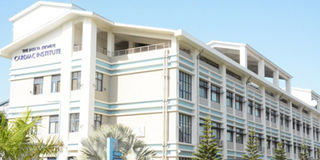JKCI conducts heart ‘ops’ on 82 children

What you need to know:
Some 28 out of the number underwent open heart surgery, while the rest underwent minor heart operations.
Dar es Salaam. Heart specialists from the Jakaya Kikwete Cardiac Institute (JKCI) at the Muhimbili National Hospital in Dar es Salaam have successfully performed heart surgeries on 82 children aged older than one (1 year) who were suffering from heart diseases.
Some 28 out of the number underwent open heart surgery, while the rest underwent minor heart operations.
A statement issued by the Institute’s public relations unit on Saturday, December 16, 2017, revealed that the children’s conditions were improving.
Conducted from December 12-to-15 this year, the surgeries were the result of a heart screening campaign held by the Institute through Saudi Arabia's ‘Little Hearts’ project. In the event, a total of 131 children more than a year old were screened for cardiac problems.
The diagnostic exercise showed that a majority of the children were found to have ‘coronary heart disease’ (CHD) and congenital heart disease, among other heart ailments.
This was the 15th heart screening camp organized by JKCI in cooperation with its partners in 2017.
According to an official statement, the JKCI specialists – working in partnership with foreign heart surgeons from India, Austria and the US, to mention a few – have already performed 120 major heart surgeries this year, whereby 80 were on children, and 40 were on adults.
Following the successful surgeries being carried at the local heart institute, the government of Tanzania has managed to save more than Sh7 billion that would have been spent if the patients were sent abroad for similar treatment, the statement reveals.
In any case – the statement also reveals – the institute faces an acute shortage of safe blood.
While calling for more people to donate blood, specialists at the Institute also counseled Tanzanians to eat ‘health foods,’ and abstain from tobacco-smoking so as to avoid putting their lives at risk of developing Non-Communicable Diseases (NCDs) such as heart diseases and cancer.




